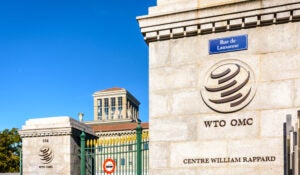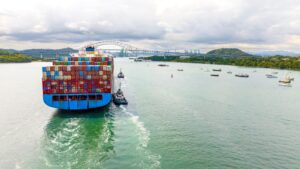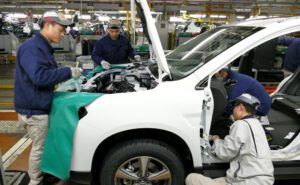Reviving Trade Justice: How Arbitration is Saving WTO Dispute Resolution (For Now)
On Wednesday, September 11, WITA will be hosting its first International Trade Reception at the Public Forum in Geneva. The reception will be held at the World Trade Organization headquarters. More information can be found here.
On Thursday, September 12, WITA will also host a panel event at this year’s WTO Public Forum in Geneva, Switzerland. The panel will explore how the WTO can help foster a circular economy for critical minerals. Find more information here and below.
The dispute mechanism and the appeal process are not fully functioning
The World Trade Organization’s (WTO) dispute settlement mechanism has not been fully functioning since December 2019. A viable alternative has emerged, but it will need more countries to sign on to help prevent cycles of tariffs and retaliation.
The United States started blocking the appointment of new judges to the WTO Appellate Body in 2017. Once the Appellate Body fell below three members in December 2019 it could no longer hear new appeals. The United States has cited concerns regarding judicial activism and sovereignty as reasons for the block. With no functioning appeals process, decisions can be appealed without resolution, making it difficult for WTO members to resolve disputes.
A temporary solution has emerged: arbitration and a speedy appeals process
Simple arbitration has always been an option. Article 25 of the WTO Understanding on Rules and Procedures Governing the Settlement of Disputes allows WTO members to use arbitration if the parties agree to a set of rules. But the case record shows that most countries have preferred the full dispute and appeal process. In fact, before the Appellate Body collapsed, the arbitration option was only used once and that was for an EU copyright case against the US involving Irish country music.
In April 2020, once it became clear the Appellate Body was no longer functional, the European Union led an effort to set up an alternative system called the Multi-Party Interim Appeal-Arbitration Arrangement (MPIA). The agreement offers members access to an independent arbitration and appeal process for dispute settlement once the panel report is complete. So far 53 members have signed up, including Australia, Brazil, Canada, China, Japan, Mexico, and New Zealand, among others. The United States is noticeably absent.
07/30/2024 | Christine McDaniel | Yeutter Institute
Using Trade to Tackle Climate Challenges

Annual temperatures are at the warmest levels since record keeping began, bringing urgency to government, business, and individual efforts to stem the climate crisis. At the same time, the transition away from fossil fuels and towards more sustainable and renewable sources of energy is upending economies, requiring transformations of manufacturing industries and investments in new industries such as batteries and other “green” technologies. Against these trends, policymakers are juggling their climate mitigation efforts while still encouraging current and future economic growth.
As the U.S. government advances its goals at home using a range of domestic economic tools, trade policy provides an avenue to expand decarbonization efforts globally. John Podesta, President Biden’s climate envoy, spoke at Columbia University earlier this year and acknowledged the fundamental nexus between trade and the environment, calling for the creation of a task force to look at how trade policies can contribute to solving urgent climate challenges. “The stakes couldn’t be higher,” Podesta said. “But I believe if we make the right choices, we can create and maintain millions of good-paying jobs in the clean energy economy of the future. We can mobilize billions in private investment in countries around the world. We can accelerate technological innovation and position nations to overcome the challenges of today and tomorrow. And we can do it while protecting our planet for ourselves and our children.”
Since 2020, the World Trade Organization (WTO) has also taken a more expansive view on the range of topics where trade could help address climate and environmental challenges. On July 4th, WTO Deputy Director General Paugam stated, ”…(W)e are at a crossroads in the multilateral system, with an opportunity to shape a global win-win approach for trade and the environment. We can combine green transition, green industrialization and trade cooperation. This is what “reglobalization” is about. And the time to act is now.”
The U.S.’s most ambitious environmental trade commitments are in the U.S.-Mexico Canada Agreement (USMCA), which allows countries to continue with domestic climate initiatives while encouraging cooperation on environmental goals and calling for a level playing field in these efforts. The work is ongoing, but separate and siloed from the other aspects of USMCA. Moving forward, there is an opportunity to incorporate climate as a core consideration in all aspects of future agreements, adding an additional priority to the existing goals of reducing barriers to U.S. exports, protecting U.S. interests competing abroad, and enhancing the rule of law.
07/17/2024 | Penelope Naas | American Leadership Initiative
If Chinese Industrial Capacity is a Problem the US Has Better Measures to Deal With It
Overcapacity in China’s green industries is now said by the United States and others to be a major problem in international trade. Subsidy and dumping practices are well defined in the WTO rulebook, which spells out remedies to compensate aggrieved producers. But ‘overcapacity’ has never been defined by the World Trade Organization, nor have remedial measures ever been articulated to deal with it.
In one sense, overcapacity could be said to characterise Swiss exports of financial services, French exports of champagne and US exports of civil aircraft. Yet overcapacity has become a negative buzzword solely with respect to China. An old complaint is China’s huge steel industry which accounts for about half of world production and about a quarter of world exports. More recently critics have pinned the label on China’s green industries — electric vehicles, batteries and solar panels. Chinese policies are denounced for encouraging plant investment far ahead of domestic demand, leading to exports at bargain prices and discouraging industries abroad.
The US Tariff Act of 1890 and the Antidumping Act of 1916 launched countervailing duties (CVD) and antidumping duties (ADD) — both additional import duties that aim to provide relief to affected domestic industries — on their way to becoming fixtures of world trade law.
Why do critics add overcapacity to the basket of unfair trade practices when CVD and ADD remedies are readily available, widely accepted, and could in principle address the unfair component of Chinese exports? The main reason for this is that only with careful analysis can the extent of subsidisation or dumping be determined and corresponding penalty duties be justified.
By contrast, once the ‘overcapacity’ label is invoked, no calculation is needed to justify a penalty duty. Since Chinese subsidies are often opaque, this is convenient. As US practice has shown, under Section 301 of the Trade Act of 1974, a penalty duty of any magnitude can be imposed against unfair trade practices, and the target importer has no effective recourse to the dysfunctional WTO dispute system.
US trade remedies under Section 301 were invoked long before Chinese overcapacity became an issue. Section 301 tariffs against China respond both to opaque subsidies and technology theft. Legal engineering has made current declarations of overcapacity equally immune to challenge as a finding of national security threat. The saga of penalty duties against Chinese exports of solar panels and electric vehicles illustrates the new landscape of trade remedies.
08/04/2024 | Gary Hufbauer | East Asia Forum
WITA – We put the community in trade community.
Information about upcoming WITA and trade community events




